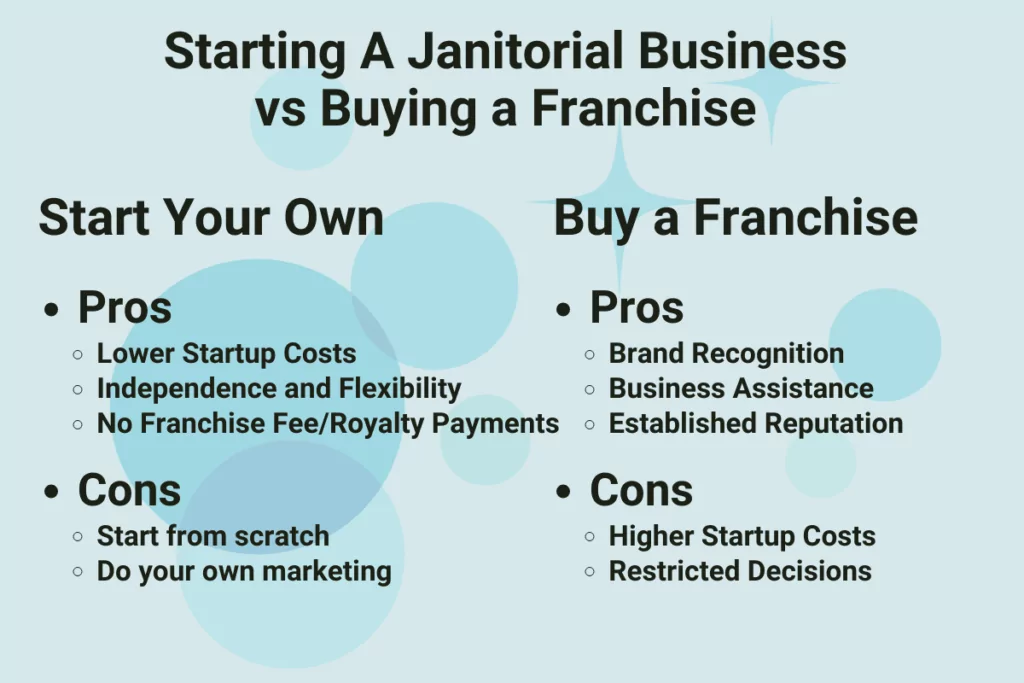How to Become a Cleaning Contractor: 8 Steps to Success
Start your commercial contracting business the right way
By Nelmie Jane Pardo | Updated April 17, 2023
A cleaning contractor provides janitorial services in commercial establishments, including office buildings, schools, hotels, and hospitals.
From cleaning restrooms and wiping up spills to restocking supplies and sanitizing surfaces, janitorial cleaning companies ensure a healthy, sanitary environment in work and business settings.
Read on to learn how to become a cleaning contractor and succeed in the cleaning industry. We’ll discuss all the essential steps in this comprehensive guide to help you establish a cleaning business.
Requirements to Become a Cleaning Contractor
1. Choose a Business Name
Think of something that immediately catches attention and perfectly represents your brand.
Your janitorial cleaning company name should be original, available, and user-friendly. It should also be easy to spell and type in Google, so people can quickly find your cleaning business.
Do these brainstorming steps to find the best janitorial business name:
- Get your creative gears turning by writing out your story. This will help you discover what your business is all about and where you’re heading.
- Jot down your inspirations, passions, and favorites. You can play with different word combinations until you reach that light-bulb moment.
Pro Tip: Your business name should be future-proof. For example, if your long-term goal is to expand to other areas, you shouldn’t choose an area-specific name like Pittsburgh Office Cleaners.
2. Estimate Startup Costs, Monthly Expenses, and Revenue
Research and planning are critical aspects of starting your own janitorial business.
- Make sure to know everything about potential startup costs, ongoing expenses, and projected earnings.
- Prepare enough capital to carry you through the first few years.
- Calculate your net income and how long it takes to recoup your initial investment.
Pro-tip: You should set a clear budget and stick to it. Remember that you likely won’t be making profits from your commercial cleaning business within the initial six months.
3. Decide Whether to Buy a Franchise or Start Independently
How do you decide which one is the better option for you? Consider these pros and cons:

Pros of Buying a Cleaning Franchise
- Brand Recognition: Joining an established franchise can give your janitorial business a quick advantage. People already know the brand, making it easy to attract customers.
- Business Assistance: Franchisors typically provide everything a new business owner needs to operate the business, including training, assistance, and business wisdom.
- Established Reputation: Buying a well-known franchise can be an excellent option for janitorial cleaning companies, as office and facility managers carefully consider the reputation of a cleaning service provider before signing a contract.
Cons of Buying a Cleaning Franchise
- Higher Startup Costs: Compared to starting your independent janitorial company, going the franchise route will be much more expensive as you have to pay a franchise fee.
- Restricted Decisions: You have less control over your business as a franchisee. You must follow the restrictions described in the franchise agreement, including your operation hours, pricing, signage, decor, and advertising.
Pros of Starting Your Own Business as a Cleaning Contractor
- Lower Startup Costs: Launching a janitorial cleaning company from the ground up is significantly less inexpensive than buying a franchise.
- Complete Independence and Flexibility: You make all the decisions from beginning to end. You have the ultimate freedom to create your service offerings and envisioned brand.
- No Franchise Fee and Royalty Payments: You don’t have to worry about continuously sharing your profits with the franchisor.
Cons of Starting Your Own Cleaning Business
- You’re Completely On Your Own: You must be confident to establish your brand from scratch and know how to gain traction in the market.
3. Determine Your Rates
Savvy business owners explore the competition to know what other cleaning professionals charge.
- Tour your service area to see how different janitorial cleaning companies operate and learn their pricing structures.
- Offer discounted cleaning prices to grow your customer base and gain loyalists.
- Or, you can offer premium services to differentiate your janitorial cleaning company from the rest.
Commercial cleaning businesses typically charge per square foot. On average, you can expect to charge around $0.05 to $0.20 per square foot for cleaning an office building.
Just make sure to ensure profitability no matter what you charge.
Pro Tip: Check out Home Advisor to compare the average rates of professional janitorial contractors within your service area.
4. Develop a Business Plan
An extensive business plan is your best companion when running your cleaning company and making crucial business decisions.
Here are several elements you can include when creating your business plan:
- Executive Summary: This is where you explain who you are and what your business offers.
- Company Background: Share more details about your janitorial company, including how you aim to attract your target customers.
- Market and Competitive Analysis: Provide a summary of your market and how you can gain an edge over the competition.
- Business Structure and Ownership: Explain your corporate structure, your experience as the owner, and the skills of valuable employees.
- Services Outline: Discuss what sets your janitorial services apart from competitors.
- Marketing and Sales: What’s your marketing strategy, and what are your target revenues?
Pro Tip: Add a financial projection section to your business plan if you intend to gain the trust of lenders. The more detailed your document is, the better.
5. Comply With Business Requirements
What types of permits, certifications, licensing, bonds, and insurance will your commercial cleaning business need?
- It’s best to consult your local and state government to learn about necessary paperwork and requirements.
- Non-compliance could lead to heavy fines or other penalties.
You can also contact the U.S. Small Business Administration to learn about business requirements and get free counseling.
SBA is an independent agency that helps small business owners succeed by providing financing options and low-cost training.
You may have to do the following to launch your own janitorial cleaning company:

Obtain an Employment Identification Number (EIN)
- The federal government provides an EIN to small businesses for unique identification.
- This number is necessary when getting business loans and filing taxes.
- You can get an EIN for free through the IRS website. The process typically takes around 15 minutes.
Get a Business License
- Find out if your state requires a license for operating a janitorial cleaning business by visiting your state’s business regulation website.
- After that, you can go to your city’s official government website to understand the process of getting a general business license.
Register Your Janitorial Company as a Legal Entity
- A limited liability company (LLC) is the most common business entity for cleaning businesses.
- It’s a business structure that protects personal assets from debts and liabilities in case of a lawsuit.
- You can also operate your cleaning business as a sole proprietor or partnership. However, these business types put owners’ personal property at risk if there are financial obligations like debts.
You may have to pay anywhere from $40 to $500 to register a legal entity. You can check your state’s official business registration website or use an online legal service to register your cleaning business.
Open a Business Bank Account
A business bank account allows you to separate your business and personal finances. You’ll find it easier to monitor your business income and expenses and do your taxes.
6. Obtain Bonds and Insurance for Financial Protection
Business insurance gives you financial peace of mind when the unexpected occurs.
More importantly, it shows clients that your business is trustworthy and strengthens the stability of your cleaning business.
Adding the words “bonded” and “insured” to your advertising materials and website greatly increases your chances of securing commercial cleaning contracts.
Here are the common types of insurance janitorial cleaning businesses usually consider before accepting clients:
- General liability insurance provides adequate coverage for common risks involved in running a janitorial company, including property damage, third-party bodily injury, and unintentional non-physical injuries.
- Worker’s compensation insurance is critical for janitorial businesses, as it funds medical costs and lost income if your employees get injured while working.
- Fidelity bond coverage, also called janitorial bond or cleaning bond, protects your janitorial business from employee theft, dishonesty, or fraud.
- Commercial property insurance reimburses you for any losses resulting from physical property damages due to an unexpected disaster.
- Commercial auto insurance is reassuring if you own or lease company vehicles.
- Business income coverage provides funds for lost income when your business stops operating due to storm damage, fire, and other covered perils.
7. Develop a Workable Business System
That means creating an operation method for everything, from restocking supplies and training employees to sending invoices and collecting payments.
Pro Tip: Find an experienced business mentor who knows everything about running a janitorial company. SCORE.org is an excellent source of free resources and volunteer business mentors who can guide you through the process of starting and growing your janitorial cleaning company.
8. Establish a Strong Presence Online and Offline
Create a professional cleaning website, update all your online business listings, and polish your social media profiles to win commercial cleaning contracts.
- All of these online marketing avenues will help validate the legitimacy of your janitorial cleaning company and attract a stream of leads to keep you busy.
- Combine your digital marketing efforts with traditional advertising, like distributing flyers and attending trade shows and local events to raise brand awareness.
Once you find your ideal clients, send a proposal using a professional cleaning service proposal template to show clients you’re the best choice.
Pro Tip: Hire experienced web design and digital marketing professionals who will create a stunning website that outshines the competition and help with your online advertising goals.
FAQs About Becoming a Cleaning Contractor
On average, janitorial cleaning company owners spend around $3,500 on startup costs, including licensing, insurance, equipment, and operating costs. Starting a janitorial business can cost up to $6,000 or more.
Your startup costs depend on the scope of work you plan to provide. If you intend to buy a franchise, you’ll have to pay for brand fees, including setup and training expenses.
Every business owner should master financial management and proper record-keeping. You may have to use all your revenues for your cleaning business expenses during the first few years and even contribute some of your personal cash.
Be sure to stick to a budget and watch your personal spending. It’s best to learn how to evaluate your monthly expense and revenue reports, so you always know where your janitorial business is going.
Final Thoughts: Launch and Manage Your Own Janitorial Cleaning Business Like a Boss
When you take time to learn everything about starting a janitorial business, you’ll be more confident to move forward and accomplish your business goals.
Consult with industry experts, do lots of research, and follow our step-by-step guide above on how to become a janitorial contractor.
And remember, make the plan and stick to the plan!
Written by Nelmie Jane Pardo

Nelmie Jane Pardo is a senior contributing writer who lends insight into digital marketing methods and business solutions. She regularly writes at BusinessHue to help business owners take their online marketing to the next level.